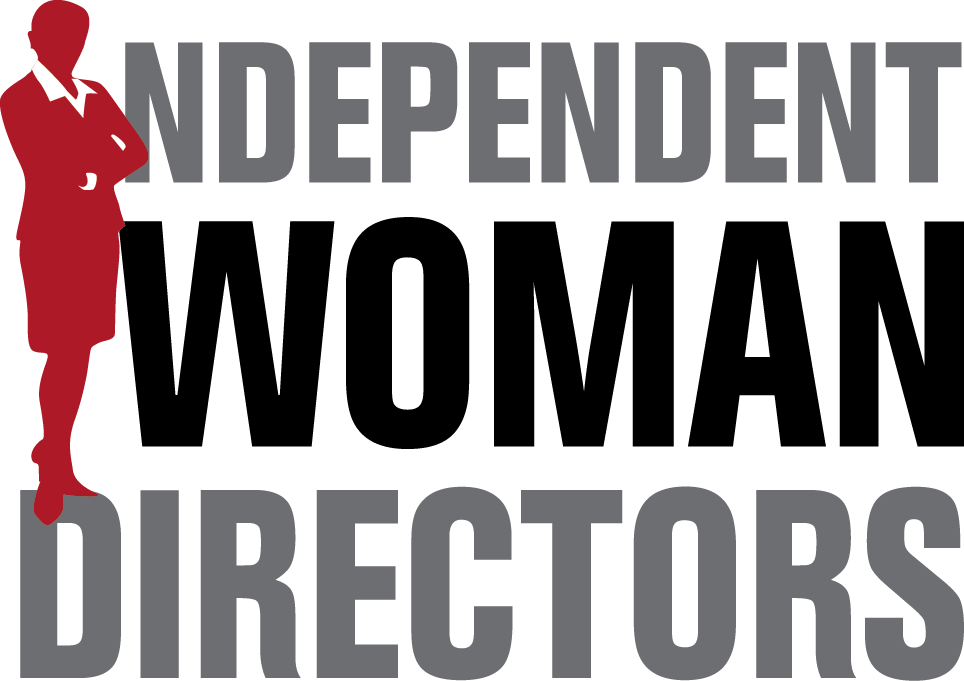Nakiye Boyacıgiller: “If it weren’t for Sabancı University, I wouldn’t have come back to Turkey. I don’t think I could be as happy in another university because the fundamental values of this university are a perfect match for mine. I think we’re doing great things for Turkey here. I will be proud to have played a part in this until the end of my life.
As a relatively new faculty, it has had remarkable achievements.
It was accredited by the AACSB (Association to Advance Collegiate Schools of Business); a mark of achievement held only by 5% of the management schools in the world.
In the region, it is the only strategic partner of MIT Sloan, one of the most prestigious management schools in the world. This is the Sabancı School of Management, of which Nakiye Boyacıgiller has been the dean for 9 years.
Let’s start from before you were a dean. How did you decide to come to Turkey?
This is going to reveal my age, but I took my undergraduate degree from Boğaziçi University in 1974 and went to the United States for graduate education. Ever since then, Ziya and I were planning to come back some time. But I went on with a PhD and Ziya started a business there, and the ‘80s wasn’t a great time to be in Turkey. Whenever we spoke of coming back, our families urged us not to because we were doing well there. As a result, we lived in America for 29 years after my graduation. I'm not going to deny that we had a happy life there, we had great opportunities. But we always kept our ties with Turkey, we came here every summer. I had been invited to the search conference for the establishment of Sabancı University. This was a great chance and the happiest, most exciting three days of my life, from an academic perspective. I was thrilled to have a word in the establishment of a new university and be the part of a dream. But my daughters were in high school back then, and you know how tricky those years are.
Indeed, adolescence.
That is why I could not be a part of the early years of the university. But I kept visiting the university and maintained close ties. In the summer of 2002, I received a phone call from then-president Tosun Terzioğlu. I had not met him because he wasn’t at the search conference. He wanted to meet me. Clueless as I was, I didn’t know what to make of this. I was here on holiday and I only had a couple more days in Istanbul; I couldn’t go to the university. He said he’d meet me where I want. We sat and talked for an hour and a half. He told me about some issues of the faculty. I didn’t know why he was telling me all this, and in the end I asked him. He told me that they wanted me to be the dean. I wasn't even head of department at the time, let alone be a dean. He said, "We trust you and it's a small faculty; you'll do it." I thought about it and I talked to my husband. I was 49 years old and we had done lots in America, we had great achievements, but the fact that I had done nothing for Turkey was a thorn in my side. Ziya and I decided to take the opportunity and accept the assignment. My older daughter was in university and her sister was finishing high school. I told them I could come if they waited for a year, and they did! When Esen graduated from high school, we moved to Istanbul in 2003 and my tenure at Sabancı University began.
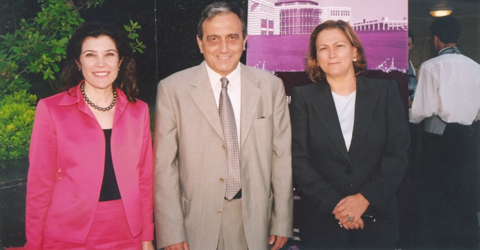
The School of Management had some remarkable global achievements under your deanship. Can you talk about these?
In a global economy, a university cannot suffice with success on a local level. This is especially true in management, where you must prepare your student for the global market. This is why international cooperation is important to us. Exchange programs are also very important and we have a great international office that works very hard for this. But we also know that, even though the ERASMUS program is a great facilitator of internationalization, it takes time for you to make a name for yourself abroad, even when you are well known nationwide. When you have an international mark of quality, it is much easier to make yourself known. The Sabancı name in Turkey meant that we had public support and respect from the first day. This owes much to the efforts of the late Sakıp Sabancı and the ongoing work of Güler Sabancı. People saw that we meant business and had the conviction that Sabancı would do great work – all of this happened relatively quickly within Turkey. But once you cross the border, people ask "What is Sabancı?" That is why accreditation was hugely important. There are more than 13,000 management programs in the world and only 5% of them have the AACSB accreditation. There is no faster way of saying “we are great” to the world.
The preparation for the AACSB accreditation was a grueling process of 5 or 6 years. We submitted massive files including the work, research and publications of our faculty members, world-class curricula, the achievements of our graduates, our ties with the business world and others. Then, a group of deans of AACSB-accredited institutions came here and ran a three-day inspection, verifying our application documents. We spent all that time and in the end, we became the second school of management to acquire AACSB certification in Turkey. Our partnership with MIT is also supremely important; it shows that we are positioned in the top league. MIT looked for a school in Turkey that is the most harmonious with its own philosophy and vision, and chose us. We have great chemistry with MIT, and I think this owes partly to the fact that our president had spent years at MIT. I too got along well with the MIT people – this is not merely a partnership of institutions, but partnership between the people as well. People have to trust you as individuals. We are doing great things with MIT Sloan.
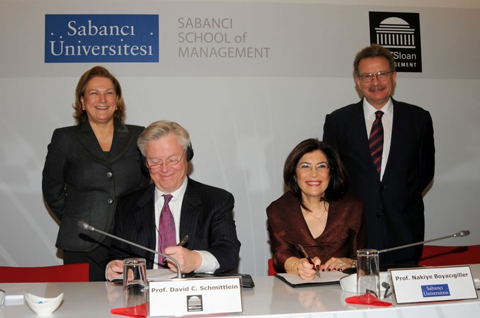
This must have to do with the energy you radiate; it must be rubbing off on the people you work with. As a female dean, do you grant priority to women or implement female quotas in your MBA or EMBA programs?
We have never imposed a quota, but we are doing globally fine in terms of a women-to-men ratio. The ratio of women in our programs varies between 30% to 40%, but I do want that to be 50%. But let me tell you something Nesrin: I have always been a feminist. I always stood up for Turkey in this matter. There are misconceptions about Turkey abroad. In Turkey, 38% of academics are women. I’ve made a point to remind everyone that this ranks well in international comparisons. Coming back to Turkey, I realized that women aren’t doing well overall, and I started to feel passionate about the issue. Outside of the faculty, my work with NGOs is always about women. I sit on the advisory board of KAGİDER, and I am also on the board of the Independent Female Directors project led by Melsa Ararat from our faculty. I think we must work more to improve the situation of women in business. As an individual and in my capacity as dean, I’d like to do everything I can to move women forward in education and business because this is of great importance for Turkey. I’m also proud of the Gender Forum and support them best as I can.
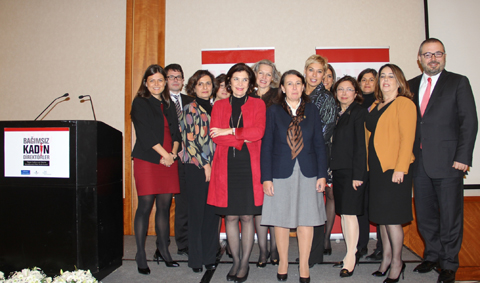
For how long have you been a dean?
I’ve completed my third term; I’m in my 10th year and I think this is a record for Sabancı University.
How about your plans after your tenure?
I will complete my 10th year in August, after which I will earn a one-year sabbatical. I’ll think about what I want to do in the future. I’ll try to take some load off my dear husband – he has been bearing the brunt of the family for 10 years. I owe Ziya in this matter and there are family issues we need to take care of. But I will stay at the university, I will give my courses; I have some things to do, a project for a book that I need to put some time in, and I need to think about what I want to do in my life. Although I’m a professor of management, I had never actually worked as a manager prior to my deanship. Deanship is management in a different way, and I loved it. I’m a project-person. I love leading a project from the finish to the end within a team. I don’t want to leave Sabancı University; I’ll keep being a professor here, give courses, do my own work, and perhaps take part in a few projects.
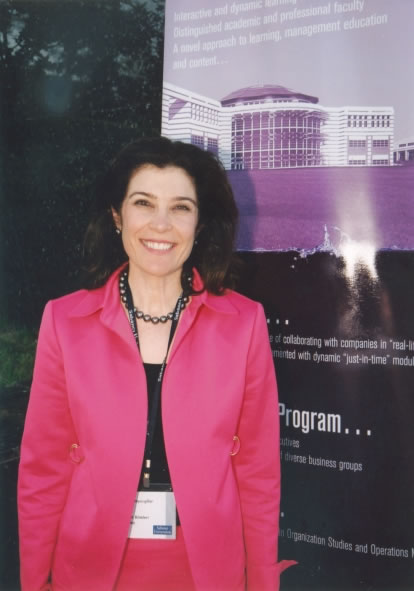
In NGOs?
Maybe that, or maybe within the university. There are options I consider, but I don’t want to make a commitment now. There are plenty of invitations to advisory boards and boards of directors. I am currently on the advisory boards of two universities and the International Board of Directors of AACSB.
You would actually make a good politician. Have you ever thought about that?
Looking at my classmates in Boğaziçi, I think educated people like us should have been more involved in politics. We are not, and I don’t think we can go on and complain about how things are not being done the way we want in Ankara. I have two problems with politics: one, I’m a very open person; I say what I think straight away and cannot be diplomatic. Two, I was born in America so I have dual citizenship. I’ve never been secretive about this but I know it could be a hindrance. But I must agree that had things been different, I could have gone into politics. I don't know how Ziya would take to this, though. His father was a member of parliament and he knows how difficult a life that is.
Your father-in-law was a deputy?
We are really lucky to have a person as colorful as you, and I think having a woman as a dean in a young university like Sabancı influenced the public reception of the university.
That may be the case.
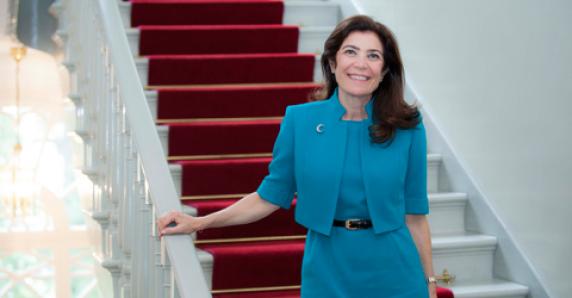
I like how you enjoy and even look for teamwork. I witnessed this many times myself: we would be up to our necks in work for an event and you would rush to our help, asking what you could do for us. You were never an aloof dean.
I love working with people.
Did you find what you were looking for in your career?
Mostly I did. I wanted an academic career so I could be of benefit to the society. Making money is of course very important too, but what mattered to me the most was whether I was doing something for the society. I think this runs in our family. Being an academic meant I could contribute to science, spend my time with young people, and have perhaps a modicum of influence in their lives – and they tell me I had. This is great.
If it weren’t for Sabancı University, I wouldn’t have come back to Turkey. I don’t think I could be as happy in another university because the fundamental values of this university are a perfect match for mine. I think we’re doing great things for Turkey here. I will be proud to have played a part in this until the end of my life. So I think I found what I was looking for at this university.
Thank you for this lovely conversation.

